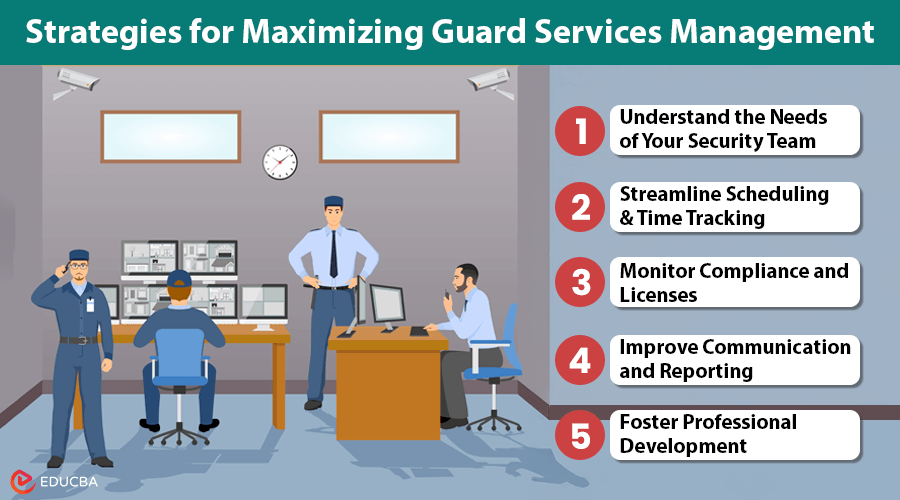
Introduction to Guard Services Management
Managing guard services can be challenging, whether overseeing a small team or a large organization. The key to smooth operations is using an all-in-one platform to help with scheduling, compliance, communication, and training. This article will help you improve your guard services management, especially when working with level 1 security license holders.
Strategies for Maximizing Guard Services Management
To effectively manage your security team and ensure smooth operations, it is essential to implement key strategies that streamline processes and enhance communication. Here is how you can achieve that:
#1. Understand the Needs of Your Security Team
The first step to effective guard service management is recognizing your team’s unique needs. A platform that unifies scheduling, reporting, and communication can provide significant support. Security guards with a level 1 security license often handle entry-level duties, such as monitoring access points and conducting patrols. While their responsibilities may seem straightforward, these guards require tools and guidance to perform their roles without disruption.
Ensure your platform offers clear role definitions, task assignments, and communication features. This will keep guards focused on their duties and reduce the likelihood of missteps. Additionally, you will want to ensure your guards’ qualifications—like their level 1 security license—are tracked and updated.
#2. Streamline Scheduling and Time Tracking
Scheduling can quickly become a headache when managing a security team, particularly if managing multiple shifts, locations, and employee preferences. An all-in-one platform can centralize scheduling, enabling you to assign shifts while easily considering availability, certifications, and performance history.
Time tracking is another crucial component. Guards must adhere to strict schedules to maintain security standards. Choose a platform that provides features like geofenced check-ins, automated reminders, and attendance monitoring. This promotes accountability and reduces the likelihood of errors, like missed shifts or late arrivals. Integrating these tools into your operations helps you allocate resources more effectively while maintaining consistent site coverage.
#3. Monitor Compliance and Licenses
Security regulations are non-negotiable. A guard’s level 1 security license must remain active, and compliance with local and state laws is critical. Manually managing these details can lead to costly oversights. An all-in-one platform should include license tracking and alert systems to notify users of upcoming renewal dates or compliance gaps. It should also securely store important documentation and give users instant access to employee credentials when needed.
Additionally, maintaining detailed incident and performance logs is vital. If a security breach occurs, having a record of who was on duty and their qualifications can make all the difference in resolving the situation. The right platform will automate this process, allowing you to focus on higher-priority tasks.
#4. Improve Communication and Reporting
Clear communication is essential for the success of any security operation. Guards must report incidents promptly and accurately, while managers must provide clear instructions and receive real-time updates. All-in-one platforms often include mobile-friendly communication tools that allow guards to share photos, videos, and detailed notes about incidents. This real-time reporting ensures that critical issues are addressed quickly and thoroughly.
Another feature to prioritize is daily activity reports. These provide a snapshot of guard performance and highlight areas requiring attention. Combined with incident logs, they give you a complete picture of your team’s activities, enabling you to make informed decisions about improving service quality.
#5. Foster Professional Development
Your security team’s success depends mainly on their skills and training. While a level 1 security license indicates foundational knowledge of the field, ongoing education is essential for career growth and enhanced service. Use your all-in-one platform to offer training modules, policy updates, and refresher courses. This will prepare your team for new challenges and demonstrate your commitment to their professional development.
Some platforms even include gamification features, allowing you to reward guards for completing training or exceeding performance benchmarks. This boosts morale and encourages long-term engagement with your organization.
Final Thoughts
Effective guard services management requires reliable tools and a thoughtful approach. Using an all-in-one platform, you can streamline scheduling, track licenses, improve communication, and support your team’s development. Focusing on the needs of your level 1 security guards and providing continuous support will help build a more reliable and efficient security team, ensuring your organization stays protected.
Recommended Articles
We hope this guide on guard services management helps you optimize security and improve operational efficiency. Check out these recommended articles for more strategies on managing and enhancing security services for your business.
